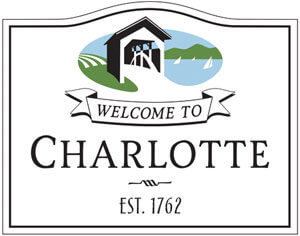Working session on wastewater anticipates Dec. 16 Selectboard vote

Monday’s Selectboard meeting began with a working session on the West Charlotte Village wastewater ordinances and ended four and a half hours later in an executive session on Charlotte Solar. Approximately 20 people attended the working session, several representing or speaking in support of the Charlotte Children’s Center and Charlotte Health Center.
Three members of the Planning Commission were also present. Dave Marshall from the West Charlotte Village Wastewater Planning Committee presented to the board the draft ordinances, which incorporated the town attorney’s recommendations and feedback from the Selectboard.
Chair Matt Krasnow opened discussion asking about a section in the ordinance referencing the other portions of the Burns property for future septic capacity expansion. “Does that need to be tested?” he asked. “Does that include other (service) areas as well?”
Marshall responded that the state doesn’t allow more than one system on a property, and the capacity limit is capped at 15,000 gallons a day. Vice Chair Frank Tenney asked if that amount, although not fully developed at this time, would take care of all of West Charlotte village. Marshall wasn’t sure, citing unknown demands of every existing building. Krasnow noted, “to give a sense of capacity and scale,” that the current capacity being discussed in the ordinances was one-fifth of the overall potential capacity of the Burns property.
Members of the public, including Dr. Andrea Regan of the Charlotte Health Center and Charlotte Children’s Center board president Jeff Hertzberger, spoke in support of the ordinances. Regan said, “We lost heat in our building twice last week. The internet was out on Wednesday. We are hoping not to spend another winter there. Whatever the decision, it just needs to be timely to allow for people to plan.”
Hertzberger said, “There is a common misconception we are getting something for free. The Charlotte Children’s Center understands the investment—it’s a benefit for the center and for the town.”
Planning Commission member and resident James Faulkner noted that “several people said they are concerned that, with this ordinance, the taxpayers are help funding private business. I hear that often and wonder how that’s being addressed.”
Selectboard member Louise McCarren responded, “The fees paid recover a fair contribution of capital cost, and the connection and ongoing fees are to maintain it.” Marshall added, “The program is specifically designed to be supported by users. This allows the town to recoup some of the monies put in place. As far as private taxpayers, we’ll be losing out on money that is otherwise being recouped by this resource.”
Selectboard member Carrie Spear asked about fees. “It would be really nice to know what the monies are …. Is the town going to have to take out a bond? These are things I’d like to know up front.”
Marshall agreed. “What’s not in the ordinance are any specific rates. That’s to be set by the Selectboard.” McCarren added, “Rates have to be adequate … and to be fair. To be clear, this is not free.”
Spear asked Marshall about a recreation center. “How much would a recreation center pay per day? Is that a high-flow or low-flow business?” Using a scenario of 100 people per day using facilities, Marshall estimated flow at about 1,500 gallons per day. “We do have to think about a rec center if the school is going to move away from programs,” said Spear.
Krasnow noted the estimate was under the 2,500 gallons of excess capacity identified and that current requests “were in the magnitude of hundreds of gallons.”
Resident Gay Regan spoke in support of her daughter. “Andrea’s working in a business that cannot stay there. Her building is inadequate. I’ve seen Charlotte lose a lot of businesses, we will lose this if the town doesn’t step up and support it.”
As the working session wound to a close, no motion was made. Krasnow said the ordinances will be the first items on the December 16 Selectboard agenda, with an anticipated vote by the board. He explained that the timing would allow for a petition to be filed within 44 days of the vote and a town-wide vote to be held 60 days later at Town Meeting.

